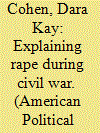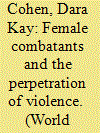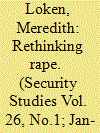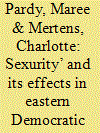|
|
|
Sort Order |
|
|
|
Items / Page
|
|
|
|
|
|
|
| Srl | Item |
| 1 |
ID:
127791


|
|
|
|
|
| Publication |
2014.
|
| Summary/Abstract |
Why do some armed groups commit massive wartime rape, whereas others never do? Using an original dataset, I describe the substantial variation in rape by armed actors during recent civil wars and test a series of competing causal explanations. I find evidence that the recruitment mechanism is associated with the occurrence of wartime rape. Specifically, the findings support an argument about wartime rape as a method of socialization, in which armed groups that recruit by force-through abduction or pressganging-use rape to create unit cohesion. State weakness and insurgent contraband funding are also associated with increased wartime rape by rebel groups. I examine observable implications of the argument in a brief case study of the Sierra Leone civil war. The results challenge common explanations for wartime rape, with important implications for scholars and policy makers.
|
|
|
|
|
|
|
|
|
|
|
|
|
|
|
|
| 2 |
ID:
121906


|
|
|
|
|
| Publication |
2013.
|
| Summary/Abstract |
Much of the current scholarship on wartime violence, including studies of the combatants themselves, assumes that women are victims and men are perpetrators. However, there is an increasing awareness that women in armed groups may be active fighters who function as more than just cooks, cleaners, and sexual slaves. In this article, the author focuses on the involvement of female fighters in a form of violence that is commonly thought to be perpetrated only by men: the wartime rape of noncombatants. Using original interviews with ex-combatants and newly available survey data, she finds that in the Sierra Leone civil war, female combatants were participants in the widespread conflict-related violence, including gang rape. A growing body of evidence from other conflicts suggests that Sierra Leone is not an anomaly and that women likely engage in conflict-related violence, including sexual violence, more often than is currently believed. Many standard interpretations of wartime rape are undermined by the participation of female perpetrators. To explain the involvement of women in wartime rape, the author argues that women in armed group units face similar pressure to that faced by their male counterparts to participate in gang rape. The study has broad implications for future avenues of research on wartime violence, as well as for policy.
|
|
|
|
|
|
|
|
|
|
|
|
|
|
|
|
| 3 |
ID:
153937


|
|
|
|
|
| Summary/Abstract |
There is widespread variation in scope, scale, and forms of rape across and within conflicts. One explanation focuses on the integration of women in armed groups. Scholars and international organizations posit that the inclusion of women in armed groups discourages wartime rape. They advocate women's increased participation to combat rape and other forms of civilian violence. Using an original dataset of women's involvement as combatants in civil wars from 1980 to 2009, I argue that the participation of female fighters has no significant impact in constraining an armed group's propensity to rape. Female combatants do not lessen rape because organizational factors, primarily culture, drive violence in armed factions and encourage conformity irrespective of individual characteristics. Advocating further militarization of women in an attempt to reduce conflict-related rape may be an ineffective policy prescription.
|
|
|
|
|
|
|
|
|
|
|
|
|
|
|
|
| 4 |
ID:
152086


|
|
|
|
|
| Summary/Abstract |
Newly recognised as a threat to global peace and security, sexual violence in conflict is now a fixed item on international security agendas. This marks significant progress for women, gender equality and the integrity of peace programmes. Our aim here, however, is to reflect upon the risks that inhere in this accomplishment. Through the concept of ‘sexurity’, a tripartite amalgam of the securitisation of sexual violence, the sexualisation of security, and the language of crisis, we outline the adverse effects of tethering sexual violence to security. This article concerns itself with the material and symbolic effects of ‘sexurity’ for eastern Democratic Republic of Congo (DRC). It first outlines ‘sexurity’ and the context of its emergence before, drawing on fieldwork in eastern DRC, the second part underlines the effects of ‘sexurity’ for the country.
|
|
|
|
|
|
|
|
|
|
|
|
|
|
|
|
|
|
|
|
|